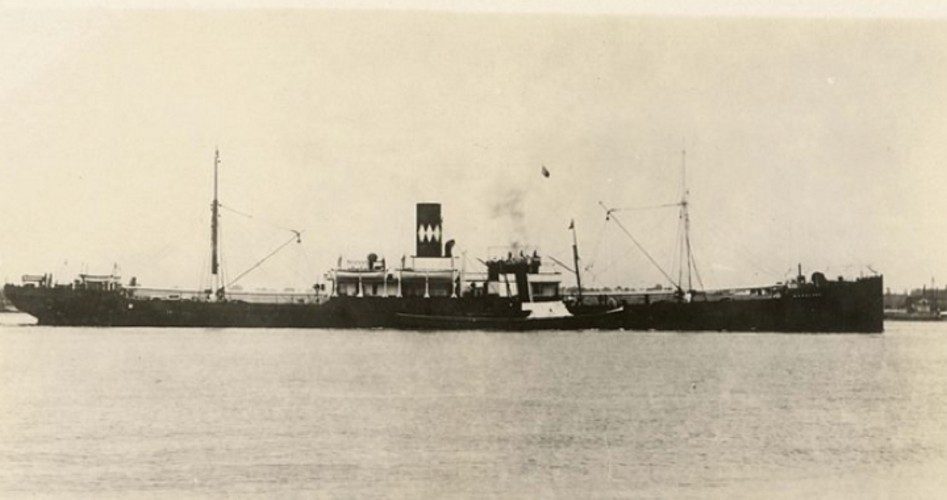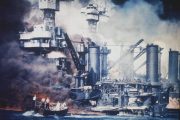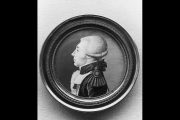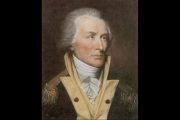
August 19, 2015 marked the 100th anniversary of the sinking of the German U-boat U-27 by the British Q-ship HMS Baralong (shown) — an infamous and barbaric act in which the British completely disregarded the Cruiser Rules of warfare.
The U-27 captured the British cargo ship Nicosian while complying with the Cruiser Rules. The U-27 surfaced and announced to the crew of the Nicosian that their ship had been captured. After boarding the captured vessel, the Germans discovered that it was hauling military cargo and told its sailors, eight of whom were Americans, that it would be sunk as soon as its crew were evacuated into lifeboats.
The Baralong appeared in response to the Nicosian’s distress and pretended to be an unarmed U.S. ship preparing to pick up the Nicosian’s crew. It was flying an American flag and had a large board with the Stars and Stripes painted on it. However, behind the board were concealed the weapons of a British warship. Reports are that the Baralong even hoisted a signal flag giving further indication it was responding as a peaceful rescue ship.
Under such circumstances, the German U-boat crew was required by the rules of war not to fire on the Baralong, as it was performing a humanitarian mission. The Germans were also forbidden to fire on a ship flying the U.S. flag because of President Wilson’s Strict Accountability Note of February 10 of that year. According to firstworldwar.com,
On 4 February the German Admiralty issued a formal declaration which warned neutral shipping to stay away from the waters surrounding Britain and Ireland from 18 February 1915 onwards on pain of sinking. Six days later U.S. President Woodrow Wilson — at that time maintaining a neutral stance — issued a thinly veiled warning to the German government. His “Strict Accountability” message made it clear that the U.S. government would not tolerate any strategy by the German navy to sink neutral U.S. shipping at any time.
The Baralong steered around the Nicosian out of the view of the crew members of the U-27. While out of sight of the U-boat, the Baralong replaced the U.S. flag with a British flag and dropped the board that concealed the armaments. What happened next was described by Colin Simpson in his book Lusitania:
She opened fire on the U-27 which speedily sank. The survivors climbed aboard the damaged Nicosian, or stayed treading water with their hands up. After picking up the Nicosian’s crew the crew of the Barralong [sic] shot every survivor from the U-27. The captain of the U-boat leapt overboard from the deck of the Nicosian when he saw what was happening and was shot by rifle fire. It was only the protests of the Nicosian’s American crew members to the State Department that made the affair public.
Had it not been for the courage of the eight American sailors who protested to the U.S. State Department of the killing of German sailors trying to surrender, the world might never have learned of this barbaric incident.
Q-ships (or Q-boats as they are also called) were top secret British weapons in World War I. Their mission was certainly enhanced by secrecy, as many military missions are. But secrecy was also necessary because these Q-ships were violating the very rules of war.
The American people were unhappy about the perfidy of British ships flying U.S. flags, and were angered earlier that year when news broke that civilian British ships were sometimes sailing under the U.S. flag in war zones. Q-ships were conducting military operations under the protection of the American flag. President Woodrow Wilson defied public disapproval and granted permission to the British to fly U.S. flags on their ships, permission that he granted in a note to the British, issued February 10, the same day as his Strict Accountability Note to Germany threatening reprisal if the Germans attacked U.S. ships.
There are reports that some Q-ships did not exchange the U.S. flag for the British flag just prior to engaging and actually fought German U-boats while flying the American flag. Eventually, after enough losses from false-flagged warships pretending to be peaceful ships on humanitarian missions, German U-boats stopped obeying the Cruiser Rules. (Under the Cruiser Rules, submarines did not attack merchant ships without warning, but surfaced and allowed merchant crews to escape in lifeboats.)



